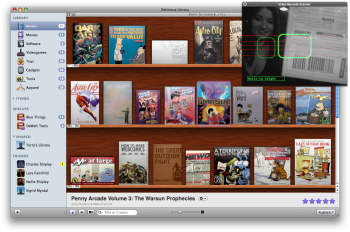Youtube Never Lose a Customer Again Book

Ever since I received an ebook reader over the holidays, I've wanted to clear out as much of my physical library as I can to replace it with digital editions.
There are, of course, a ton of things I'll miss about traditional books. But one thing I absolutely won't miss is how much room they take up. Every time I move, I end up lugging around a dozen boxes filled with heavy books that I'm not likely to open up more than once a year.
Finding ebook versions of much of my library didn't take long. In fact, many of my books had entered the public domain and were available for free from Project Gutenberg. What to do with all my physical books now that I no longer need them has been a much more difficult problem to solve.
Luckily, some great sites and tools helped me organize my library of 150 or so books in just a few hours, helped me sell the books I no longer needed, and even helped me find places to donate the books I couldn't sell.
[Read: Digitize Your Analog Life]
What Stays and What Goes
It can be complicated to sort out what to do with each of your books. Almost no one really wants to get rid of all of them. I have signed copies and others that were given to me as gifts that I don't want to part with for sentimental reasons. To add even more complication, you're unlikely to get the best price for all your books if you sell them to only one bookseller. As a result, you have to keep track of which books stay and which go, and where they're all going to.

You can't find a one-size-fits-all service that will let you easily get rid of everything. If you have more than a dozen or so books to sell, you will probably want to use some sort of organizational tool to sort out what you plan to do with each title. I had almost a hundred that I wanted to lose, so I used a Google Docs spreadsheet to keep track of what was going where manually.
If you've got a larger collection, you might consider an organizer like Delicious Library or MediaMan that lets you simply scan the barcode of each book to get its information onto your computer. Note: Manually entering book titles and editions into a spreadsheet or document can quickly get tedious.
Where to Sell Your Books Online
Ideally you'd like to make some cash from your little-used books, but dragging a large book collection around to local booksellers is a significant hassle.
The easiest places to sell your books online are also where you'd probably go to buy them. Amazon's Sell Your Books program is mostly meant for textbooks, but does let you sell other books. FYI: The few remaining textbooks I have from school ended up selling to Amazon for more than all my other books combined.
Sell Your Books was easy to use, and I managed to get Amazon to accept about half of the books I owned. (Note: If a paperback edition of your hardback book is out, you're usually out of luck on selling the hardback.) The prices on Amazon's service were also comparable to, or slightly better than, those I found on other services.
Half.com also has a buyback program that focuses on textbooks. Their prices for my books were similar to Amazon's, and the site said it would accept a wider selection of my books.
If you want a quick and dirty way to figure out where to sell your books online, it's probably easiest to go with an aggregator site that pulls from multiple book buyers like BigWords or DealOz.
I used BigWords, which pulls pricing data from a dozen or so retailers. The service also lets you enter multiple ISBN numbers so that you can check prices for multiple books in one search.
Before using an untested book buyer, though, check out the details–you might end up paying more for shipping than you make from its higher listed price.
Amazon will pay for you to ship your books to it, and Half.com offers a significant reimbursement that should cover the cost of shipping for most books. However, smaller operations may not have the same policy.
Either way, don't expect to make a huge sum off of your book collection. Depending on what you have in your library, you'll probably make enough to offset the cost of replacing the paper versions with ebooks. But unless you've got some rare first editions lying around, you're unlikely to make a hefty profit.
What to Do if You Can't Sell Your Books
Even with a site like BigWords, some of your books just aren't going to be worth the effort to sell online. If they're still in relatively good condition, however, you can always donate them. It's probably still easier for most people to donate books to their local library, or to Goodwill, the Salvation Army, or other local charities.
The Wisconsin Department of Public Instruction has put together a handy list of library agency websites nationwide if you need to know where to go to donate locally. If the list doesn't have a nearby option for you, and you think you'll have trouble finding a convenient place to donate, several charities accept book donations by mail.

These include Books For Soldiers, Books for Africa, and Better World Books–all great options. But remember that these charities don't pay for shipping books to them, so it is definitely cheaper for you to donate to a local nonprofit. Still, if you like the charity or cause, supporting it is probably more than worth the cost of shipping it the books.
whiteheadfewillic.blogspot.com
Source: https://www.pcworld.com/article/473779/move_to_digital_lose_your_unwanted_books.html
0 Response to "Youtube Never Lose a Customer Again Book"
Post a Comment